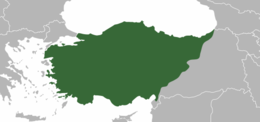
Back Anatolië Afrikaans Kleinasien ALS አናቶሊያ Amharic Peninsula d'Anatolia AN Læsse Asia ANG الأناضول Arabic ܐܢܛܘܠܝܐ ARC اسيا الصغرى ARZ Anatolia AST Kiçik Asiya Azerbaijani
Anadolu | |
|---|---|
 Anatolia, also known as Asia Minor, has two definitions. It is either the entire Asian area of Turkey,[1] or is bounded by an indefinite line from the Gulf of Iskenderun to the Black Sea.[2] | |
| Etymology | "the East", from Greek |
| Geography | |
| Location | Turkey |
| Coordinates | 39°N 35°E / 39°N 35°E |
| Area | 756,000 km2 (292,000 sq mi)[3] (incl. Southeastern and Eastern Anatolia Region) |
| Administration | |
Turkey | |
| Largest city | Ankara (pop. 5,700,000[4]) |
| Demographics | |
| Demonym | Anatolian (Turkish: Anadolulu[5]) |
| Languages | Turkish Minority: Kurdish, Armenian, Greek, Kabardian, North Caucasian languages, various others |
| Ethnic groups | Turks, Kurds, Armenians, Chechens, Circassians, Greeks, Laz, various others |
| Additional information | |
| Time zone | |
Anatolia (Turkish: Anadolu), also known as Asia Minor,[a] is a large peninsula or a region in Turkey, constituting most of its contemporary territory. Geographically, the Anatolian region is bounded by the Mediterranean Sea to the south, the Aegean Sea to the west, the Turkish Straits to the north-west, and the Black Sea to the north. The eastern and southeastern boundary is either the southeastern and eastern borders of Turkey,[1] or an imprecise line from the Gulf of Iskenderun to the Black Sea.[2] Topographically, the Sea of Marmara connects the Black Sea with the Aegean Sea through the Bosporus strait and the Dardanelles strait, and separates Anatolia from Thrace in the Balkan peninsula of Southeastern Europe.
The ancient Anatolian peoples spoke the now-extinct Anatolian languages of the Indo-European language family, which were largely replaced by the Greek language during classical antiquity as well as during the Hellenistic, Roman, and Byzantine periods. The major Anatolian languages included Hittite, Luwian, and Lydian, while other, poorly attested local languages included Phrygian and Mysian. Hurro-Urartian languages were spoken in the southeastern kingdom of Mitanni, while Galatian, a Celtic language, was spoken in Galatia, central Anatolia. Ancient peoples in the region included Galatians, Hurrians, Assyrians, Hattians, Cimmerians, as well as Ionian, Dorian, and Aeolic Greeks. The Turkification of Anatolia began under the rule of the Seljuk Empire in the late 11th century, continued under the Ottoman Empire between the late 13th and early 20th centuries, and continues today under the Republic of Turkey. However, various non-Turkic languages continue to be spoken by minorities in Anatolia, including Kurdish, Neo-Aramaic, Armenian, North Caucasian languages, Laz, Georgian, and Greek.
- ^ a b
- McColl 2014, p. 922: "Thrace, its European area, is about the size of VERMONT at 9,412 square mi (24,378 square km). Its Asian area (Asia Minor) is called Anatolia and covers 291,971 square mi (756,202 square km)"
- "Turkey". The World Factbook. Central Intelligence Agency. Retrieved 20 February 2024.: "the 97% of the country in Asia is referred to as Anatolia"
- "Anatolia". Encyclopedia Britannica. Retrieved 29 February 2024.: "Anatolia, the peninsula of land that today constitutes the Asian portion of Turkey"
- Steadman & McMahon 2011, p. 466
- Howard 2016, p. 7
- ^ a b Hopkins, Daniel J.; Staff, Merriam-Webster; 편집부 (2001). Merriam-Webster's Geographical Dictionary. Merriam-Webster. p. 46. ISBN 978-0-87779-546-9. Archived from the original on 28 November 2021. Retrieved 18 May 2001.
Anatolia: The part of Turkey in Asia equivalent to the peninsula of Asia Minor up to indefinite line on E from Gulf of Iskenderun to Black Sea comprising about three fifths of Turkey's provinces
- ^ Sansal, Burak. "History of Anatolia". Archived from the original on 6 April 2002. Retrieved 7 December 2017.
- ^ "Turkish Statistical Institute The Results of Address Based Population Registration System 2017". www.turkstat.gov.tr. Archived from the original on 2 May 2019. Retrieved 2 September 2020.
- ^ Güncel Türkçe Sözlük, s.v. Anadolu
Cite error: There are <ref group=lower-alpha> tags or {{efn}} templates on this page, but the references will not show without a {{reflist|group=lower-alpha}} template or {{notelist}} template (see the help page).
© MMXXIII Rich X Search. We shall prevail. All rights reserved. Rich X Search